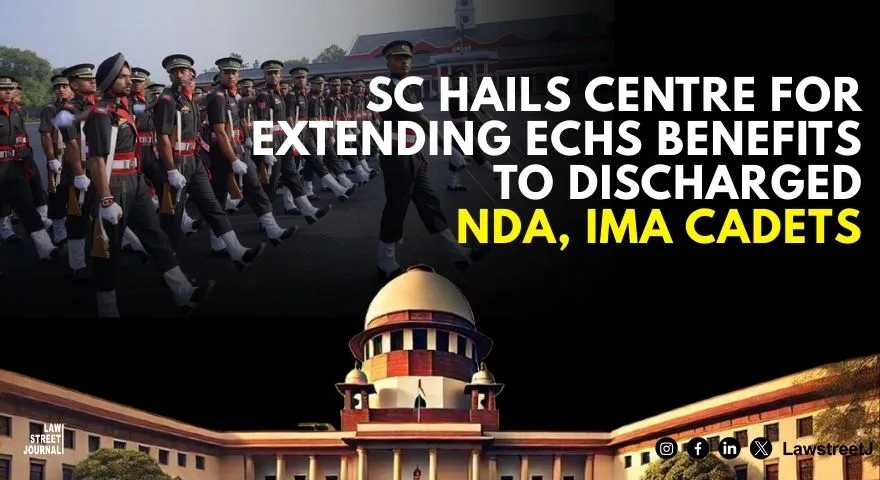NEW DELHI: The Supreme Court on Thursday appreciated the Union government's decision to provide medical facilities under the "Ex-Servicemen Contributory Health Scheme" to NDA and IMA cadets, discharged due to disabilities suffered during training.
On behalf of the Centre, Additional solicitor general Aishwarya Bhati submitted submitted before a bench of Justices B V Nagarathna and Prashant Kumar Mishra that from August 29, all such cadets were included in the ECHS scheme, and the one-time subscription fee has also been waived off for them.
While directing the Centre to complete the registration preferably by September 15, the court also appointed senior advocate and former Delhi High Court's judge, Justice Rekha Palli as amicus curiae in the matter.
"The Ministry of Defence Department of Servicemen Welfare has extended medical facility in the form of ECHS to all invalidated out-boarded cadets, without charging any subscription fee in as much as the one-time subscription fee of Rs 1,20,000, which is currently payable by officers, may not be paid by such invalidated/out-boarded cadets," the court noted.
The bench commenced the positive response from the government for extending the medical facility for treatment in the form of the ECHS scheme to the invalidated and out-boarded cadets.
The bench said that details of the said scheme should be brought on record. It also said out-boarded cadets are at liberty to apply for membership under the ECHS scheme.
A counsel said he has been informed by cadets that the applications for membership are not going through. Another counsel said it requires a rank for the application, and his clients do not have any rank other than ex-officers’ cadets. Bhati said the concerned authorities will examine these difficulties.
On this, the court said that the registration would be streamlined, and the out-boarded cadets who intend to register would be able to register preferably by September 15, 2025.
The court also said there should be a reassessment of outboarded cadets for the purpose of resettlement, and asked the Centre to formulate a scheme for medical reassessment.
In connection with the insurance scheme currently in existence, the court said it may not be adequate and efforts could be made to enhance the insurance cover for the outboarded cadets.
“These are educated people, and they have cleared the entrance exam. They are capable of doing some or the other kind of job. Not as an ex-serviceman, but if some sort of desk job can be given as far as possible," the bench said.
The bench was informed that in case of death, an amount of Rs 12.5 lakh was paid as a one-time ex gratia payment and Rs 9,000 per month to the kin, and from 1992 onwards Air Force, Army and Navy have their own insurance, which is like a subscription-based insurance.
“So, cadets are included in those. There is the army group insurance fund. Monthly insurance premium is paid by service personnel," Bhati said.
On the issue of monetary benefit, the court observed that the ex gratia amount should be enhanced, particularly bearing in mind the current state of inflation and price rise.
The court decided to the consider the suo motu matter for hearing on October 7.
On August 12, the court registered the case after the news report raised the issue of these cadets, who were once part of training at the nation’s top military institutes such as the National Defence Academy (NDA) and Indian Military Academy (IMA).
The report stated that around 500 officer cadets have been medically discharged from these military institutes since 1985, due to varying degrees of disability incurred during training, and are now staring at mounting medical bills with an ex gratia monthly payment that's far short of what they need.
Unlike soldiers in this category, who were entitled to ESM status, all of these officer cadets got an ex gratia payment of up to Rs 40,000 per month, depending on the extent of disabilities, which fell far short of basic needs.
Disclaimer: This content is produced and published by LawStreet Journal Media for informational purposes only and does not constitute legal advice. The views expressed are independent of any legal practice of the individuals involved.















